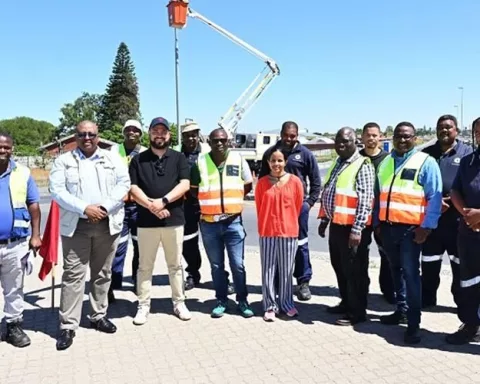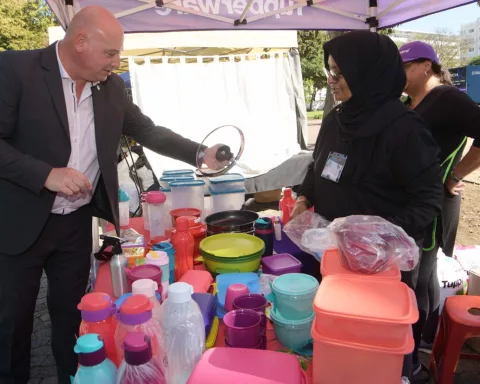KwaZulu-Natal Province in South Africa is facing severe weather conditions, including heavy rain and powerful winds, causing destruction and leaving families homeless. The Provincial Disaster Management teams are providing critical support to those affected by the severe weather incidents, and the province’s government is joining forces with other departments to offer assistance to all victims. Despite the widespread destruction, the spirit of collaboration and support among communities, along with the commitment of the disaster management teams and the provincial government, is a testament to the strength and resilience of KwaZulu-Natal’s people.
How is KwaZulu-Natal Province dealing with severe weather conditions?
KwaZulu-Natal’s Provincial Disaster Management teams have taken prompt action to offer critical support to those affected by severe weather incidents. The provincial government is joining forces with other departments to provide assistance to all victims. Disaster management teams remain vigilant, prepared to respond and help those in need. The story of KwaZulu-Natal Province emphasizes the importance of proactive and efficient disaster management strategies and the need for preparedness in the face of extreme weather situations.
Facing Mother Nature’s Wrath
The KwaZulu-Natal Province in South Africa exhibits its resolute spirit and tenacity as it deals with increasing adversities. The region has recently been hit by torrential rains and powerful winds, causing immense destruction, particularly in Mtubatuba, situated in the province’s northern part. Amidst the chaos, KwaZulu-Natal’s Provincial Disaster Management teams have taken prompt action to offer critical support to those affected by these severe weather incidents.
In Mtubatuba alone, initial accounts indicate that four people sadly perished due to an intense thunderstorm accompanied by fierce winds. The storm tore roofs off houses and caused extensive damage to infrastructure, including power cables, roads, bridges, and vehicles. Over 70 homes in the Somkhele and KwaMyeki areas have been identified as demolished, leaving families homeless. In response, community halls and churches have welcomed the public, while others have found alternative lodging with relatives.
The Province Unites in Crisis
The situation extends beyond Mtubatuba, with other parts of the province also feeling the fury of Mother Nature. In the Harry Gwala District, the Greater Kokstad Municipality endured the impact of heavy rains and a hailstorm in the Pakkies Location. Although six households were affected, fortunately, no fatalities, injuries, or displaced people have been reported so far. Similarly, heavy rains in Madakeni location under Umzimkhulu Municipality affected four households, with no fatalities reported at this time. In the Umgungundlovu District, approximately 23 households in the Rosetta Informal settlement under the Mpofana Local Municipality were impacted by a hailstorm.
In the Zululand District Municipality, powerful winds destroyed a block of rental rooms in Ulundi the previous night. Thankfully, no injuries were reported in this incident. Despite the widespread destruction, KwaZulu-Natal’s MEC for Cooperative Governance and Traditional Affairs, Bongiwe Sithole-Moloi, has expressed her deepest condolences to the families and friends affected by these difficult times. She stressed that disaster management teams would continue on-site evaluations and provide vital relief, including mattresses, blankets, food, and plastic sheeting.
Strength in Adversity
The provincial government is also joining forces with other departments, such as social development and human settlement, to provide assistance to all victims. Teams are working relentlessly to assess the damage and determine the required government intervention. MEC Sithole-Moloi has urged communities to prioritize safety measures, such as relocating to safer areas where possible. As torrential rains continue to batter parts of the province, disaster management teams remain vigilant, prepared to respond and help those in need.
The ongoing evaluations will result in an updated report, consolidating initial findings to offer a clearer understanding of the scope and consequences of these weather events. In the meantime, the spirit of collaboration and support among communities, along with the commitment of the disaster management teams and the provincial government, is a testament to the strength and resilience of KwaZulu-Natal’s people.
These current events in KwaZulu-Natal serve as a stark reminder of nature’s power and the need for preparedness in the face of extreme weather situations. While we cannot control the weather, we can take measures to ensure that our communities are ready and able to handle such events. The KwaZulu-Natal Province’s story, with its proactive disaster management teams and solid community ties, offers valuable lessons for us all.
The severe weather incidents also prompt us to think about the broader implications of climate change and how it may increase the frequency and intensity of such events. The story of KwaZulu-Natal Province emphasizes the importance of proactive and efficient disaster management strategies and the need for governments, communities, and individuals to be prepared for the challenges that lie ahead.
1. What severe weather conditions is KwaZulu-Natal Province facing?
KwaZulu-Natal Province in South Africa is currently facing heavy rain and powerful winds, causing destruction and leaving families homeless.
2. How is KwaZulu-Natal Province dealing with the severe weather conditions?
KwaZulu-Natal’s Provincial Disaster Management teams are providing critical support to those affected by the severe weather incidents. The provincial government is also joining forces with other departments to offer assistance to all victims. Disaster management teams remain vigilant, prepared to respond and help those in need.
3. Where has the severe weather caused the most destruction?
The northern part of the province, particularly in Mtubatuba, has experienced immense destruction due to the thunderstorm and fierce winds. Over 70 homes in the Somkhele and KwaMyeki areas have been identified as demolished, leaving families homeless.
4. How many fatalities have been reported due to the severe weather?
Four people have sadly perished in Mtubatuba due to the intense thunderstorm accompanied by fierce winds.
5. What kind of damage has the severe weather caused to infrastructure?
The storm tore roofs off houses and caused extensive damage to infrastructure, including power cables, roads, bridges, and vehicles.
6. How is the government providing assistance to victims of the severe weather?
The provincial government is joining forces with other departments, such as social development and human settlement, to provide assistance to all victims. Disaster management teams are assessing the damage and determining the required government intervention. Vital relief, including mattresses, blankets, food, and plastic sheeting, is being provided to those affected.
7. What broader implications do the severe weather incidents prompt us to think about?
The severe weather incidents prompt us to think about the broader implications of climate change and how it may increase the frequency and intensity of such events. It emphasizes the importance of proactive and efficient disaster management strategies and the need for governments, communities, and individuals to be prepared for the challenges that lie ahead.
8. What lessons can we learn from KwaZulu-Natal Province’s story?
The story of KwaZulu-Natal Province, with its proactive disaster management teams and solid community ties, offers valuable lessons for us all. It emphasizes the importance of preparedness in the face of extreme weather situations and efficient disaster management strategies.








